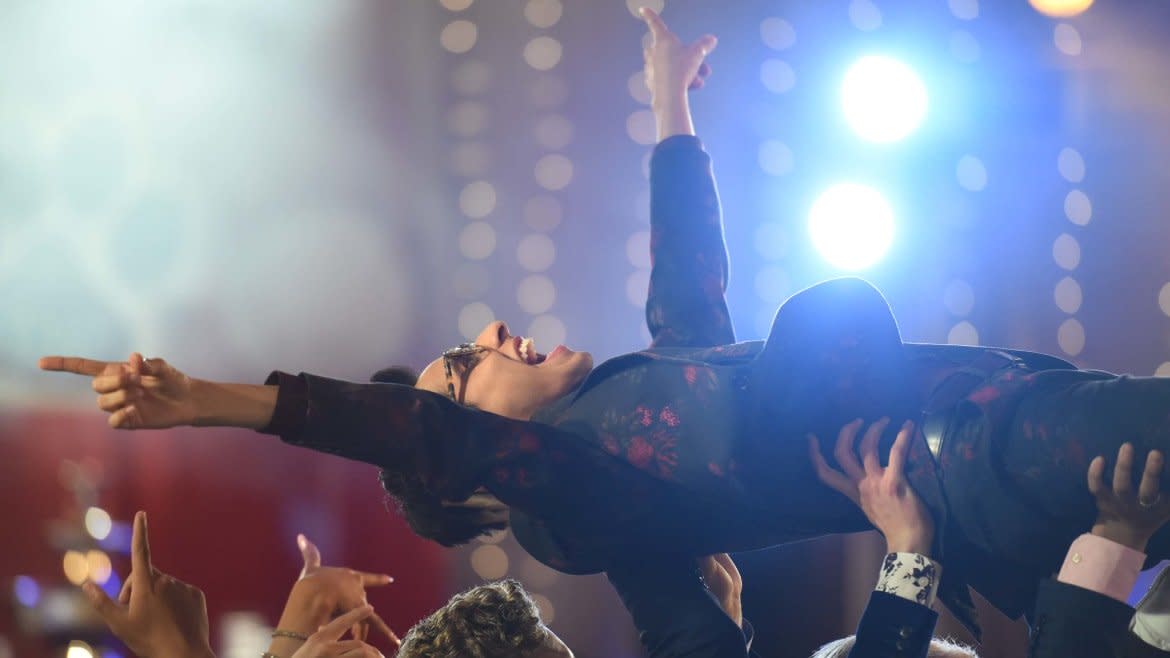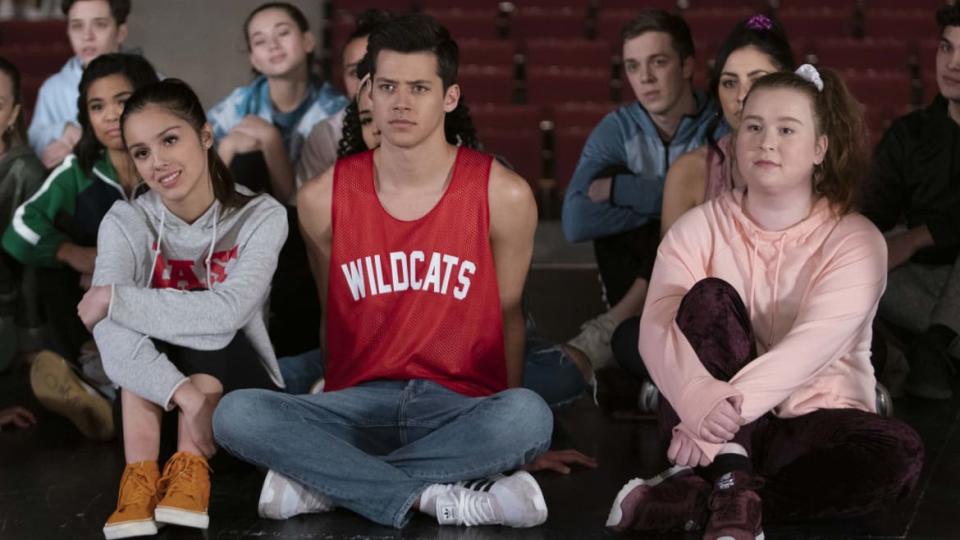The Woke Genius of ‘High School Musical: The Musical: The Series’ (Really)

First of all, the name. High School Musical: The Musical: The Series. The double colon hurdling you into a spiral of meta madness and grammatical exasperation. Why name the new series, among the buzzy freshman class launching the new Disney+ streaming service on Tuesday, something so attention-grabbingly ridiculous?
It turns out that there is a totally legitimate rationale behind it: Why the hell not?
When the Disney Channel phenomenon High School Musical premiered in 2006, it did so with its own absurdist winking at its genre. So blatant in its pursuit of creating another generation-defining high school-set musical in the tradition of Grease and Footloose, the film telegraphed its own ambition in the title: High School Musical.
Pitching his take on the property—which spawned two sequels, a reality series, and a stage musical—to Disney, HSM:TM:TS creator Tim Federle knew trying to do a remake with cheap imitations of original stars Zac Efron and Vanessa Hudgens would get everyone involved crucified.
He had just finished watching the teen true-crime docuseries satire American Vandal on Netflix, and was inspired to give a new visual language to the familiar world of the original franchise. What if this new series returned to the halls of East High, where the students are putting on a new production of the High School Musical stage production, and it was all filmed mockumentary style, like The Office?
“The double colon is all about irreverence,” Federle says. “The whole thing is a meta celebration of the franchise, so the double colon came out of wanting to own the fact that it’s this thing on top of a thing on top of the thing.” He laughs. “People are definitely talking about it. But I think it’s one of those things that, when you see it—I hope—you start to get in on the joke.”
Of course, musical theatre is no laughing matter to Federle, just as High School Musical is whispered about with a hushed reverence in his new series. (“Your generation deserves to make its mark on this classic,” preaches Miss Jenn, the drama teacher played by Kate Reinders. “Watch out, world.”)
Before Federle wrote the screenplay for the animated film Ferdinand, the book of the musical Tuck Everlasting, or his young adult novels (Better Nate Than Ever, The Great American Whatever) and themed cocktail books (Hickory Daiquiri Dock: Cocktails With a Nursery Rhyme Twist), he was a theatre kid. And then a theatre star. After growing up in Pittsburgh, he appeared in the original Broadway casts of The Little Mermaid and the 2003 Gypsy revival starring Bernadette Peters.
“As a lifelong theatre kid, I’m appreciative of anything that make musicals feel, like, 6 percent cooler than we all know they actually are,” Federle says. So even though he’s of a generation older than the one that went gaga for Zac Efron performing a production number while dribbling a basketball and lacked their inherent reverence for the Disney movies, “I appreciated what High School Musical did in the world. But I also felt like it was time to kind of reinvent of it.”
And that’s how, come Tuesday when Disney+ launches, High School Musical: The Musical: The Series as he envisioned it will be available for streaming. It is an improbably woke version of a kitschy Disney property for tweens that, all at once, is inspired by American Vandal and Modern Family, the Parkland generation and Greta Thunberg, and, of course, the hallowed original Troy and Gabriella themselves, Zac Efron and Vanessa Hudgens.
It’s like Mad Libs in the age of the streaming wars, and the only way this endeavor would have worked.
Here’s the thing. Yes, High School Musical really is that popular.
When the original movie aired in 2006, it was one of the most-watched premieres ever for the Disney Channel. The soundtrack topped the Billboard chart. Within a year, it generated $500 million in DVD, album, and retail sales. It is estimated that over 225 million viewers around the world have seen it at some point. Efron and Hudgens instantly became teen idols.
The plot was simple and familiar, as if produced by a “teen musical” generator. Troy (Efron) and Gabriella (Hudgens) have a meet-cute at a ski lodge while on vacation during winter break. When school resumes, they’re startled to see each other. Gabriella, it turns out, just transferred to East High.
Gabriella is shy. Troy is a star on the basketball team. He surprises everyone by auditioning for the school musical to impress her. She’s inspired to break out of her shell. Various schemers attempt to keep them apart and, more importantly, keep them from landing leads in the musical. But love, talent, and top-billing in a Disney Channel production prevail.
Songs like “We’re All in This Together,” “Bop to the Top,” and “Breaking Free” never seized the zeitgeist in the way tracks from Grease did. But the musical’s young fans were ravenous in their adulation—even if older critics scoffed or were mystified by the popularity. The truth is, and Federle corroborates after meeting countless teens and young twentysomethings while casting, High School Musical is a tentpole for young millennials and Gen Z.
He assumed that when the High School Musical: The Musical: The Series actors arrived at the show’s Salt Lake City set—it’s shot in the same school where the original was filmed—knowing every lyric to the songs, it was because they had been cast on the show. But it was because they had grown up on these movies, which were run in such perpetuity on the Disney Channel it practically embedded itself in the psyche of their generation.
At the center of High School Musical: The Musical: The Series is a love triangle. Nini (Olivia Rodrigo) and Ricky (Joshua Bassett) are in the throes of puppy-love romance. Then Ricky, spooked by her “I love you” confession, suggests they take a break while she attends theatre camp over the summer. While there, she develops a “showmance” with another camper, EJ (Matt Cornett).

Jealous at their relationship when school starts again, Ricky, who had never shown interest in musicals before, decides to audition for the upcoming production of High School Musical in an attempt to win Nini back and keep her and EJ from playing romantic leads. The series mixes auditions and rehearsals of memorable High School Musical songs with original material, in some cases written by the cast members themselves. (A lucrative High School Musical: The Musical: The Series soundtrack is one collateral goal of the project.)
Federle only watched the original films a handful of times before mapping out the series, wanting to celebrate them without feeling beholden to them or distracted by a billion-dollar franchise.
“At a certain point you have to get away from Troy and Gabriella,” he says, which means introducing more of the characters’ academic lives and scenes set outside of school, in essence expanding the show into an ensemble comedy. “You don’t just want it to be Smash with acne.”
Helping to establish the show’s unique identity is a certain amount of “wokeness.” It not only serves as a blaring reminder that this is a show premiering in 2019, but is also intrinsic to the everyday vernacular of the modern teenagers it portrays. Not 10 minutes go by in the show’s pilot before one character lays out her ambitions to dismantle the patriarchy and invokes the phrase “intersectional feminism.”
“I think that part of it is, like, I need to look no further than my actual cast to see how engaged they are with the real world,” Federle says. “I mean, Olivia Rodrigo is constantly posting about veganism on Instagram, and I realize that she just lives and breathes that sense of ‘I’ve got a voice and I’m going to use it and not wait for a gatekeeper.’ I think the TikTok generation doesn’t wait for permission.”
Even in a series that is ostensibly a cheeky spin on a campy musical, it’s not tonally out of place.
“I don’t think it's that much of a reach, in that we are living in the Parkland generation—and thank goodness we are,” he says. “I think Greta Thunberg is rewriting the rule book on climate change because she’s certainly not seeing the grown-ups do it. And I think that if there’s any statement I’m trying to make with the show, it’s that you should always count on the theater kids, which is really a proxy for anyone who feels disenfranchised individually. But when you group up together, you can sort of David-versus-Goliath the whole world, one stage at a time.”
The key is that, always, High School Musical: The Musical: The Series isn’t taking itself too seriously. (It helps to constantly type out that full title to really drive home that point.)
There’s a scene in the first episode in which Miss Jenn encounters a flamboyant gay boy at auditions and says, “You’re reading for Ryan, right?” the bedazzled siren of flamboyance played by Lucas Grabeel in the movies. “I think he’d rather play Sharpay,” her assistant whispers to her, referring to Ashley Tisdale’s outrageous, diva-esque pink poodle of a character. “I love that,” Miss Jenn says. “So fresh.”
It’s not just a great queer-positive joke and message, but a clever remark on the commodization of wokeness and inclusivity. “It’s a little bit of a comment on a comment,” Federle says. Besides, it’s certainly believable that a teenage boy in 2019 would want to play the Sharpay role. He would have. The difference is, when he was in high school, he wouldn’t have been brave enough, or felt safe enough, to say it.
At the center of all this discussion, though, is what it means to be a theatre kid in 2019. The biggest difference, and something the series reflects, is that there’s not as much of a stigma in being a drama dork, especially after the success of Glee and the mainstream crossover of musicals like Dear Evan Hansen and Hamilton.
“I think that awkward is the new awesome,” Federle says. “I think that Jennifer Lawrence became a star when she tripped on the steps at the Oscars. I think this is a generation that likes to see things be more unfiltered—ironically, for a generation that filters so much online.”
Social media and “like” culture has, in a strange way, made uniqueness and individuality celebrated in an age group where blending in was wnce the ultimate goal.
“I think everyone's letting their freak flag fly a little bit more now than they did a decade ago,” Federle says. “If you're doing it on your own, you might just be a weirdo. But if you team up with other people, you're suddenly part of a girl group. And I think that's sort of the power of theater kids.”
In other words, we’re all in this together.
Got a tip? Send it to The Daily Beast here
Get our top stories in your inbox every day. Sign up now!
Daily Beast Membership: Beast Inside goes deeper on the stories that matter to you. Learn more.
